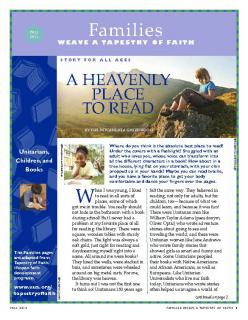Subversive Ideas in Children's Books
By Pat Kahn

In her 2013 Minns lecture, Sticking with Stories: Unitarianism and the Creation of Children’s Literature, Rev. Andrea Greenwood described the emergence of books for children as a genre separate from mainstream literature. One unintended consequence of this separation, which I find intriguing, is that children’s literature gave “radicals a place to hide.”
Because of anxiety that the Soviet Union was ahead of the U.S. scientifically after World War II, federal money was poured into publishing educational materials to encourage young people into scientific fields. As a result, many teachers and writers out of work because of suspected Communist ties were hired to write science and social science books for children which introduced a method of critical thinking. As Greenwood explains, “these were science books that subtly introduced social issues and raised whole new generations of idealists.” She points out that Unitarian Sunday Schools had linked science to social and religious development at least ten years earlier; Unitarian science curricula gained sudden popularity in the mid-1940s and became a major factor in the denomination’s growth.
I believe that to introduce and nurture critical thinking skills is one of the most important tasks anyone involved in Unitarian Universalist faith development can do for children and youth. As religious educators and parents, we have an opportunity to lay a foundation for lifelong learning that continually engages us all in ”a free and responsible search for truth and meaning.” As with the Unitarian science curricula of old, the heart of the UUA’s Tapestry of Faith programs today is the vision of children, youth and adults who “realize that they are moral agents, capable of making a difference in the lives of other people, challenging structures of social and political oppression, and promoting the health and well-being of the planet.”
A fellow traveler down the road of subverting children toward critical thinking was historian Howard Zinn, author of A People’s History of the United States. Zinn died in 2010; he would have turned 91 on August 24, 2013. Together, two educational advocacy and resource organizations—Rethinking Schools and Teaching for Change—have collaborated to connect educators with Zinn-inspired curricula and guidance for engaging children in a critical perspective on history. While many resources on the Zinn Project website are geared for classroom use, they are easily adaptable and useful for a Unitarian Universalist religious education program, a family dinner-time conversation, or another setting where the work of growing idealists can happen.
Next Steps!
Find out more about Unitarians’ involvement in creating and promoting children’s literature and explore how to make reading with children a faith practice—if it isn’t already one of yours—in the Family pages of the Fall 2013 UU World magazine.